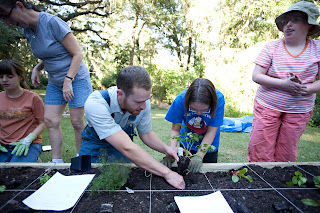Mary Ann Lindley: "Food Day takes to the streets (and gardens)"
Sunday, Oct 9, 2011
Tallahassee Democrat
 |
| Beautiful Picture by Inga Finch |
In addition to the emotional appeal of ice cream, it's Exhibit A — maybe B, if you count a nice glass of wine — of items that we tell ourselves we "deserve."
Long day, hot day, too much going on, exhausted, annoyed, heartbroken, depressed: Ice cream with all the trimmings comes to the rescue.
Still, very little can be said for it nutritionally, not even if you're looking at it as a calcium supplement. Likewise, not much can be said for the great gobs of food that pop up on the TV screen glistening with butter (a couple of hours before bedtime), successfully tempting Americans to savor the joy of their journey to obesity. At which time they wonder how they got there, and how to make the return trip to a more livable weight.
If you're trying to lose, or even maintain your poundage, think about these encouraging mottoes: "Nothing tastes as good as skinny feels" and "All things in moderation."
The first was the comment that got supermodel Kate Moss in trouble for inadvertently encouraging teenage girls to become anorexic, but it's got some truth in it.
The other one I thought was my Mom's firmly held position on between-meal snacks, but it turns out it was Aristotle's idea. And it didn't have much to do with food, but rather finding the middle ground between excess and deficiency in all things.
Meanwhile, as millions of Americans wrestle with obesity, at the other end of the guilt trip is hunger.
According to the World Hunger Education Service, one in seven households in the U.S. is "food insecure." The organization, which has been monitoring hunger since 1976, defines food insecurity: "At times during the year, the food intake of household members was reduced and their normal eating patterns were disrupted because the household lacked money and other resources for food."
Last year, the U.S. Department of Agriculture projected that more than one in eight Americans — about 43.3 million people — would have participated in the Supplemental Nutrition Assistance Program (formerly called food stamps) through the end of this year.
Obesity and hunger are not necessarily the opposites that you might at first think, however.
They are linked, and both are part of the mission of Food Day, which is a grassroots movement that's swept the country, and which has some committed participants here in North Florida.
You might not expect, for example, to find both Brogan Museum Executive Director Chucha Barber and Florida Commissioner of Agriculture and Consumer Services Adam Putnam at work on the same cause.
But on Food Day, which is Oct. 24, Putnam will preside over the Florida Grown School Lunch Week kickoff in the Capitol courtyard (10 a.m. to 1 p.m.). It's saluting school lunch programs that use locally grown foods, which is a meaningful boon to Florida farmers as well as student health.
Leading up to that, the Brogan will throw open its doors onto Kleman Plaza on Oct. 23 for a free concert, with several food trucks and activities for children. If you go, bring some canned food to donate to Second Harvest of the Big Bend, our local hunger-fighting agency.
That Sunday afternoon, inside the Brogan, the case for community gardens as part of the sustainable food movement will include presentations from various youth groups, including St. John's Missionary Baptist Church, the Youth Empowerment Leadership Development Academy, Florida Youth Against Hunger and Tallahassee Sustainability Group.
Who knew so many young people were involved in this movement? Yet it is their future.
And many of the food-day activities at the Brogan should be quite entertaining — the museum's bee colony and hive, which was set up in 2008 on National Pollinator Day, continues to be a popular but not-quite hands-on exhibit.
Nathan Ballentine, whose Tallahassee Food Gardens enterprise builds individual and community raised-bed gardens, combines his devotion to food security, the relationship between food choices and obesity, and the sustainability economy, which includes raising some of your own food and supporting locally grown produce.
Ballentine, who wears blue denim overalls like my dad used to wear decades ago, said there are between 40 and 45 community gardens in Tallahassee. That includes the oldest one, FAMU's Community Garden, which was started in 1974, and new ones he's working on in SouthWood and at Kate Sullivan School on Miccosukee Road. A Saturday morning tour of many community gardens will be Oct. 22.
Those shared gardens are really where it all comes together, both as an antidote to food shortages and an incentive to food choices that help prevent childhood obesity and all its side effects, which plague overweight adults and the entire health-care industry.
This Food Day effort, unfolding during our perfect fall season, which in our region is very good for gardening, could gently change habits, tastes and lives.
Both Kate Moss and Aristotle would like the idea.